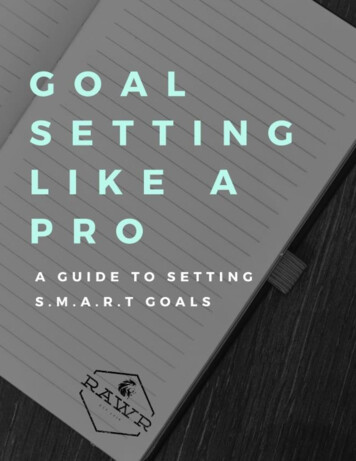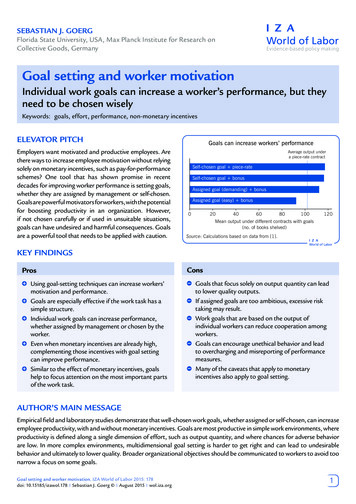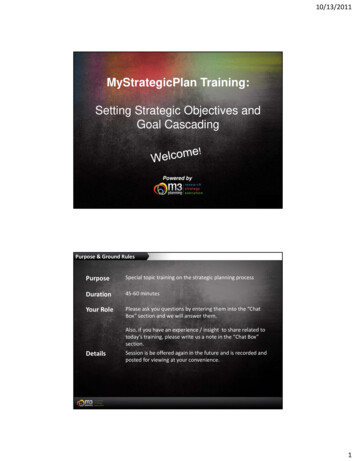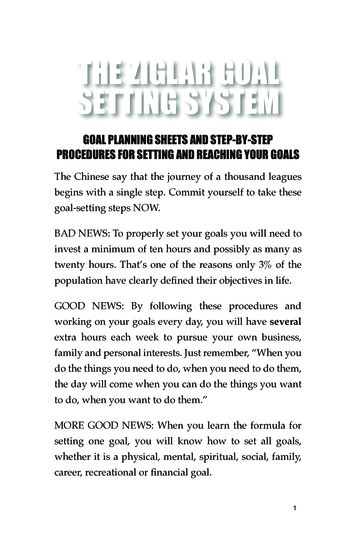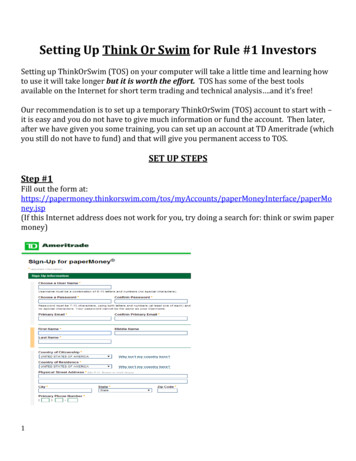
Transcription
GOAL SETTINGS E C O N DE D I T I O NHow to Create an Action Plan andAchieve Your GoalsSusan B. Wilsonand Michael S. DobsonAMERICAN MANAGEMENT ASSOCIATIONNew York Atlanta Brussels Chicago Mexico City San FranciscoShanghai Tokyo Toronto Washington, D.C. 16657 FM11-30-07 14:42:51PSPAGE i
Special discounts on bulk quantities of AMACOM booksare available to corporations, professional associations,and other organizations. For details, contact SpecialSales Department, AMACOM, a division of AmericanManagement Association, 1601 Broadway, New York, NY10019.Tel: 212-903-8316. Fax: 212-903-8083.E-mail: specialsls@amanet.orgWebsite: www.amacombooks.org/go/specialsalesTo view all AMACOM titles go to:www.amacombooks.orgThis publication is designed to provide accurate andauthoritative information in regard to the subject mattercovered. It is sold with the understanding that the publisher isnot engaged in rendering legal, accounting, or otherprofessional service. If legal advice or other expert assistanceis required, the services of a competent professional personshould be sought.Library of Congress Cataloging-in-Publication DataWilson, Susan B.Goal setting : how to create an action plan and achieve your goals /Susan B. Wilson and Michael S. Dobson. — 2nd ed.p. cm. — (WorkSmart)Includes index.ISBN 978-0-8144-0169-9 (pbk.)1. Goal setting in personnel management. 2. Goal (Psychology)3. Management—Psychological aspects. 4. Planning. I. Dobson,Michael Singer. II. Title.HF5549.5.G6W55 2008650.1—dc222007039111䉷 2008 American Management AssociationAll rights reserved.Printed in the United States of America.This publication may not be reproduced, stored in a retrievalsystem, or transmitted in whole or in part, in any form or byany means, electronic, mechanical, photocopying, recording,or otherwise, without the prior written permission of AMACOM,a division of American Management Association, 1601Broadway, New York, NY 10019.Printing number10 9 8 7 6 5 4 3 2 1. 16657 FM11-30-07 14:42:51PSPAGE ii
CONTENTSPreface to the Second EditionvPart ISetting Personal GoalsChapter 1Getting StartedChapter 2Potential Obstacles to Reaching Your Goals12Chapter 3Eleven Strategies to Optimize Reaching YourGoals213Part IIEffective Goal Setting and People SkillsChapter 4Assertive Behavior33Chapter 5Changing People’s Behavior44Part IIIEffective Goal Setting and Management SkillsChapter 6Setting Priorities57Chapter 7Planning63Chapter 8Delegating68Chapter 9Time Management75iii. 16657 CNTS11-30-07 14:42:54PSPAGE iii
ivContentsPart IVAchieving Your GoalsChapter 10Getting Help in Reaching Your Goals85Chapter 11Getting the Power to Get Things Done91Chapter 12Project Management for Goal Achievers102AppendixGoal Achievement Worksheet113Index115. 16657 CNTS11-30-07 14:42:54PSPAGE iv
PREFACE TO THE SECOND EDITIONWhen people find out I’ve written several books, the first response is often, ‘‘Gee, I’ve always wanted to write a book.’’My first question is always the same, ‘‘Why?’’People are often puzzled at the question, but it’s the most important question of all in setting and achieving your goals. Youaren’t chasing this goal for the fun of it, but because you believeachieving the goal will satisfy some need, solve some problem, orprovide some benefit. If you can’t clearly explain why you want toachieve the goal, there’s a good chance you may head off in thewrong direction.Let’s apply the question to this particular goal: Why wouldsomeone want to write a book? Well, there are many possible reasons. Here are some of the more common ones:(a) You want to make as much money as J. K. (Harry Potter) Rowling.(b) You want to appear on Oprah and be famous.(c) You want to impress people with your talent.(d) You have something really important you want to share withthe world.(e) It’s your art.(f ) It’s your therapy.v. 16657 PREF11-30-07 14:42:57PSPAGE v
viPreface to the Second EditionFor example, if your real goal is money, there are lots morereliable ways of getting it than by writing books. Yes, a few writersmake an awful lot of money, but the vast majority of publishedauthors make little or nothing. One writer I know devoted severalyears to writing a novel he knew would make a lot of money. Hedid well—achieving the Book of the Month Club, gaining foreigntranslations, and even selling the movie rights. But he wasn’t satisfied. He expected to make millions. So he gave up. If you want tosucceed at a goal, you need to understand why you want it. This iscritical.You have to do this process for any goal you set for yourself.Why do you want it? How does this goal relate to your other goals?What will be different for you when you succeed? Are there betterways to get there? What elements of the goal are the most valuableand the most important to you?You’ll learn in the pages of this book how to set a goal, how tomake a plan, and how to acquire the resources and power necessary to achieve your goal. What you have to supply is the quality ofyour self-understanding. If you understand why, maybe you’ll pursue the same goal, or maybe you’ll change to a goal that actuallyrelates more closely to what you hope to gain.Knowing why gives you strength and power. If your goals arechallenging (and they should be), achieving them takes hard workand risk. If the goal isn’t really important to you or if you’ve pickeda goal that won’t really satisfy the ‘‘why,’’ it’s awfully difficult tomaintain the self-discipline to get the job done.A case in point: My best friend in college used to publish anamateur mimeographed magazine containing essays by a Pennsylvania schoolteacher who had sold a novel, quit his job, and let hiswife support him. He was a good example of what not to do, or soI thought. For years, every time my friend and I got together andtalked about old times, sooner or later one of us would ask, ‘‘Whatdo you suppose ever happened to Dean Koontz?’’You probably already know how this story turns out. DeanKoontz has managed the rare feat of having ten New York Timesnumber one bestsellers, and is still going strong. (His wife, I’veread, still works: She manages their business.)He knew what he wanted and why he wanted it, and so he wasable to persist in the face of skepticism and rejection.Always ask, ‘‘Why?’’ The more reasons you have to pursue agoal, the better you’ll likely do in terms of achieving it. I write be-. 16657 PREF11-30-07 14:42:58PSPAGE vi
Preface to the Second Editionviicause I have a perspective on people and organizations that I wantto share. But writing is not the only way to do that; I also teachseminars. I like the act of writing; I like seeing my books in bookstores.Why do you want to achieve your goals? The answer to thatquestion has power. It’s what motivates you. It’s what shows youthe right path to take. And it’s what opens the doors that lead toyour success.—-Michael S. Dobson. 16657 PREF11-30-07 14:42:58PSPAGE vii
This page intentionally left blankPAGE viii
1PART ISETTING PERSONAL GOALS. 16657 PRT111-30-07 14:43:04PSPAGE 1
This page intentionally left blankPAGE 2
CHAPTER 1GETTING STARTEDHave you ever wondered why some people seem to have theability to accomplish a lot? They know where they are headedand exude an enviable confidence. Effective goal setting isone of their keys to success. You may be working very hard at whatyou do, but without setting goals you’ll find that your hard workdoesn’t yield meaningful results.Remember Alice in Wonderland? At one point in the story, Alicestops at the crossroads to ask the Cheshire Cat which road to take.He responds by asking where she wants to go. When she tells himthat she ‘‘doesn’t much care where,’’ he replies, ‘‘then it doesn’tmatter which way you go.’’ As a result, she wanders aimlessly in hertravels.Like Alice, we often travel the road of life without a specificdirection or goal. Few of us make goal setting a priority. In fact,studies have shown that most people either do not know whatthey want from life or, if they do, have no plans for realizing theirdreams. Only a small percentage of people have specific, welldefined goals. And people who most frequently reach their goalsare those who write them down and develop the plans to reachthem.Take a moment to consider why writing down your goals makes3. 16657 CH111-30-07 14:43:21PSPAGE 3
4Setting Personal Goalssuch a significant difference in ultimate performance. Why do youthink that writing down one’s goals is so important?If your response included the idea that goal achievers recordtheir goals so that they can read them, absorb them, and plan forthem, then you are on the right track. People who achieve theirgoals take an active role in achieving them. They write them down,and then plan for their achievement. This chapter considers tenguidelines for evaluating and writing down your goals. If you followthese guidelines, you will establish your goals in a way that nearlyguarantees your effort will be rewarded. Time and again, your reward is successful goal achievement.Before learning the ten guidelines for effective goal setting, takea few minutes to identify two of your goals—they can be anythingas long as they are meaningful to you—and write them down.Then, complete the self-audit, which identifies ten elements for effective goal setting. Evaluate the extent to which you use theseideas when developing your goals.Your Goals1.2.Now complete the self-audit on page 5 by checking either ‘‘NearlyAlways,’’ ‘‘Sometimes,’’ or ‘‘Rarely’’ for each statement.TEN GUIDELINES THAT REALLY WORKThe questions you just answered identify ten guidelines for effective goal setting. Using these ideas ensures that you establish goalsthat can be accomplished. The ten guidelines are:1. Effective goals are written. Many of us daydream aboutwhat we would like to accomplish. But how many of us pick up apen and write down those things we most want to achieve? Once adream is committed to paper, it becomes concrete. Your dream is. 16657 CH111-30-07 14:43:21PSPAGE 4
Getting Started5given a sense of reality. Writing down your goals is a first steptoward achieving them.SELF-AUDIT FOR GOAL SETTINGNearlyAlwaysSometimesRarely1. When I set a goal, I write it down.2. I describe my goal in specific,measurable terms.3. I often visualize my goals.4. My goals are achievable.5. I set realistic deadlines forcompleting my goals.6. I break a large goal intomanageable units.7. I look for the potential problems thatmay keep me from reaching mygoals.8. I take action to remove or minimizethose potential problems.9. I review progress toward my goalson a regular basis.10. I know the personal rewards ofreaching my goals.Assess your responses by counting the number of times you responded ‘‘NearlyAlways’’ and multiply that number by 3. Multiply the number of times you responded‘‘Sometimes’’ by 2, and the number of times you responded ‘‘Rarely’’ by 1. Thenadd the resulting three numbers for a total score.(number of responses) ⳯ 3 ⳱(number of responses) ⳯ 2 ⳱(number of responses) ⳯ 1 ⳱GRAND TOTAL ⳱Nearly AlwaysSometimesRarelyAnalyzing Your ScoreScore of:24–30Excellent job of setting effective goals. If you find that you do an excellent job of setting goals, but you feel you could be more successful inreaching them, then Chapter 2 may be especially meaningful for you. 16657 CH111-30-07 14:43:21PSPAGE 5
6Setting Personal Goals18–23You are on your way to achieving effective goal setting. Take anotherlook at the statements where your responses were less than ‘‘NearlyAlways.’’ These are the areas for additional concentration.Below 18There are several areas in which you can improve your goal setting. Insetting the goal of reading and using this book, you are becoming amore effective goal setter.2. Effective goals are written in specific, measurable terms.If you write your goal in specific terms, then you probably haveexpressed it in a measurable way. A goal needs to be measurable sothat your progress can be evaluated and so that you will knowwhen you have achieved your goal. For instance, you may thinkabout learning a new computer software package. But only whenyou describe your goal as ‘‘taking a class in WordPerfect betweenMarch and June and spending six to eight hours a week to learn itsapplications to my job’’ will you have a definable, measurable goal.EXAMPLES OF MEASURABLE GOALSBy April 1, I will have my taxes completed and ready tobe mailed.This week I will make fifteen sales calls and close onfour of them.We will hire a new secretary within two weeks.3. Effective goals can be visualized. Picture yourself reachingyour goal. Picture the result, the moment, and your feelings. Muchof our energy for reaching goals comes from a desire to attain them.Usually, the more you desire something, the harder you will worktoward achieving it. For example, a sales rep has won severalawards. He accomplishes his extraordinary sales goals by visualizing his reward of receiving the plaque and winning the trip eachyear. He says, ‘‘I can see myself walking across the stage, beingcongratulated by the CEO, and enjoying my moment in the spotlight. When I’m having a slow day, I just visualize the result that Iwant, and it renews my energy.’’.Victor Frankl is a Viennese psychologist and survivor of a WorldWar II concentration camp. In his book Man’s Search for Mean-. 16657 CH111-30-07 14:43:22PSPAGE 6
Getting Started7ing, Frankl describes people who were able to visualize theirgoals for living and, consequently, were able to withstand thetortures of their circumstances. He maintains that people whohad no purpose died quickly; those who kept an eye on theirgoals were more likely to survive.4. Effective goals are achievable. Goals need to challengeyour skills and abilities, without discouraging your effort and performance. For example, when initially implementing a quality management program, companies do not usually target the highlyacclaimed and highly competitive Malcolm Baldrige National Quality Award as their first goal. Instead, they establish less stringentquality goals at first so that work teams can experience success inreaching those more realistic goals. As competency, success, andconfidence grow, work teams may then decide to stretch for thehigher goal.5. Effective goals have realistic deadlines. Goals need aschedule. You are more likely to take action when you set a realistictime frame for accomplishing your goal. Schedule enough time toreach the goal, but not so much time that you lose interest in it.How many people have you heard say they need a vacation fromtheir work but don’t get around to taking one? A far higher percentage of people meet their goal when they record their specific intentions. ‘‘I will plan a vacation for the second week in March andarrangements will be settled by January 15.’’6. Effective goals are manageable. Sometimes a goal canseem overwhelming because of its size. But if it is divided intosmaller components, then it becomes easier to manage and isachievable. To hear your boss say that he wants you to openseventy-two accounts this year may sound unrealistic, but if youthink of it in terms of six accounts each month, then the goal ismore manageable.7. Effective goals are analyzed for their potential problems. As you establish a goal, consider the steps you must take toaccomplish it. Analyze the goal for potential problems that mightkeep you from reaching it. If a goal initially is considered in termsof what could go wrong, then you can take action to resolve orminimize problems before they occur. Critical thinking helps youcover all the angles and stay on the path toward achieving your goal. 16657 CH111-30-07 14:43:22PSPAGE 7
8Setting Personal Goals.ANALYZE YOUR GOAL FOR POTENTIAL PROBLEMSWhat could go wrong with the goal of ‘‘Meeting a Project Deadline’’?1. A member on the project team does not complete his or herpart on time.2. A needed piece of equipment may break down (e.g., wordprocessor).3. Unexpected tasks related to the project may arise.4. The supervisor may not like the format of the final result.8. Effective goals require action to eliminate or minimizethe consequences of potential problems. This is the followthrough for identifying potential problems. At this point, you identify the action that is required to either remove the cause of theproblem or minimize its consequences. For example, an unproductive team member could be the cause of a potential problem. Eliminate the problem by removing the unproductive member from theteam. Other potential problems, however, can be dealt with onlyby minimizing their impact. For example, in manufacturing there isoften a potential for equipment breakdown. Minimize the consequences by providing regular maintenance or having backup equipment available.9. Effective goals include a regular review of progress. Aperiodic review of your goals will help ensure that they continue tobe realistic, timely, and relevant. Consider, for example, the humanresources director who, only twelve credit hours and a dissertationaway from her doctorate, decided to quit. How could she invest thetime, money, and energy to get so far toward a goal and then quit?After serious review of her career, family, and financial goals, sherealized that the degree did not hold the promise it once had. Obtaining a doctorate was no longer a relevant goal for her life circumstances and interests.10. Effective goals yield rewards that are of value to you.We stay motivated to work toward our goals when we know anddesire the resulting rewards, whatever they may be. As you establisheach goal, identify at least one meaningful reward for yourself. Itmay be money, recognition, a day off, or the quiet pleasure you feel. 16657 CH111-30-07 14:43:22PSPAGE 8
Getting Started9for a job done well. Your reward can be anything of value to you,something that motivates your effort to accomplish the goal. Without recognizing specific benefits that accrue as a result of your efforts, the probability of reaching that goal decreases.With these ten points in mind, review the two goals you wroteon page 4. Consider the extent to which you can use the ten guidelines just discussed.Which of the guidelines are the most difficult for you to use?Keeping the guidelines in mind, how would you rewrite your goals?Goals provide direction for your life; they focus your activities.Goals are the points on your roadmap where you can apply yourtalents and energies. Without well-constructed goals, your life isgoverned by whim or the urgency of the moment. But effectivegoals will provide you with the internal control to make things happen the way you want them to.DO YOUR GOALS SHOW YOU THE WAY?At the beginning of this chapter, you listed two goals to jump-startyour thinking. Then you were given ten guidelines to help you consider those goals in a more systematic way. For the next exercise,review the areas of life listed next for which effective goal setting iscritical. Check those areas for which you already have significantgoals. Then write down those goals using the worksheet. If you needto, refer to the goal-setting guidelines to help you stay on track. 16657 CH111-30-07 14:43:23PSPAGE 9
10Setting Personal GoalsLife AreasPlace a check mark by those areas in which you want to write goals. Spiritual Personal development Leisure time Professional Civic/community Family Social Health/physical well-being Educational Financial OtherGOALS WORKSHEETLife AreaGoals1.2.3.Life AreaGoals1.2.3. 16657 CH111-30-07 14:43:23PSPAGE 10
Getting Started11Life AreaGoals1.2.3.Life AreaGoals1.2.3.Life AreaGoals1.2.3.Life AreaGoals1.2.3. 16657 CH111-30-07 14:43:23PSPAGE 11
CHAPTER 2POTENTIAL OBSTACLES TOREACHING YOUR GOALSSuppose you know what you want, and you are on the righttrack to accomplishing your goals. Without warning, you suddenly face an obstacle that blocks your progress. And then itis difficult to remain focused and energetic. If you do nothing aboutthe obstacles that arise, they can sap your energy, your time, andyour enthusiasm. Consider the following list of obstacles that couldblock you from accomplishing your goals.I need to feel secure.I may fail.I doubt my skills.Changing the way I do things is not easy.I have too many things to do.Each of these is a potential barrier you set up yourself to defeatyour effort. But there are strategies for removing them—or at leastfor minimizing their impact.I NEED TO FEEL SECUREMany of us fear that if we try something new, we may lose our senseof security. We enjoy the security of life as we know it. The irony isthat this security can change at a moment’s notice.12PAGE 12
Potential Obstacles to Reaching Your Goals13A major layoff at work, a storm that destroys your community,a personal tragedy—these events can put your security at risk andquickly alter your life. You don’t have the power to control all theelements that can potentially affect you. So, a more dependablecourse of action is to build an internal security system within yourself. Instead of trying to grasp at an intangible security that couldchange momentarily, develop the coping skills that are so essentialfor life in a world of probable changes. Effective coping skills usually include the ability to handle stressful events, the ability to takecalculated risks, and the ability to manage problems as they arise.An internal security system, built through effective coping skills,will help you make reasoned choices. You will find that the fear ofgiving up security will diminish as an obstacle to your success.A middle manager who enjoyed the security of a hefty paycheckand company benefits also faced the strain of a dead-end job.His daily work lacked challenge, and it was not likely he wouldreceive another promotion. He decided to weigh the merits ofcontinuing in a secure but lackluster job versus the risk of seeking new challenges. After a six-month job search, he found aposition that was a better fit with his talents and interests. Andin the process, he developed the internal strengths of initiative,confidence, and improved interviewing skills. Just three monthsinto his new position, he learned that several middle management positions, including his former position, had been eliminated at his former employer. For him, this was a lesson in howquickly one’s perceived security can change, and how importantit is to develop the personal strength to cope with life’s changingcircumstances and inherent risks.Are you willing to give up some of your perceived security to accomplish a goal? If not, why not?Do you agree that to ‘‘not change a thing’’ can be a risk? Why?. 16657 CH211-30-07 14:43:24PSPAGE 13
14Setting Personal GoalsWhich of your goals seems risky? Why?Thinking About RiskThere are several ways to increase your level of comfort and manage the perceived risk associated with meeting one of your goals:Specify the risk you associate with the particular goal underconsideration. Identify how large that risk really is. If its potential impact is low, then rational thought suggests that the risk isminimal.Determine the probability of that risk occurring. Is it very likely,somewhat likely, or not very likely at all? Unless the probabilityof occurrence is fairly high, your energy and time are betterspent addressing higher-risk issues.Identify the benefits that accrue from taking the risk and succeeding. After you determine the probability and degree of therisk, you may decide that the anticipated benefits outweigh thepotential disadvantages.Once you identify the probability and impact of the risk, andthe benefits from pursuing the goal, there may be added advantage in seeking input from a friend or adviser.Several years ago, the new president of a company that manufactures plastics established a goal that had a low probability of serious risk but large potential financial benefits. The companywanted to sell polyurethane products to the oil and gas industry.Unfortunately, following the company’s investment of 500,000into the proposed product, the oil industry collapsed unexpectedly, and the investment was lost. Although it was a calculatedrisk, the company’s president maintains that he used the failureas a learning opportunity. Instead of bemoaning his loss, heturned to his internal security system. He used well-honedproblem-solving and stress-management skills to learn from thesituation. As a result, he found other opportunities to pursue,and he maintained his ability to take other risks that have led toprofitable products. 16657 CH211-30-07 14:43:24PSPAGE 14
Potential Obstacles to Reaching Your Goals15I MAY FAILWhen is the last time you failed at something? Was it truly a failureor were you able to learn from the situation? No one enjoys thefeeling of failure, but often we are overly critical and extra-hard onourselves. And once we feel that we have failed, we replay the incident in our mind until we view ourselves as failures instead of having one failed goal. If you fail to reach a goal, view the situationobjectively. Avoid harboring negative emotions and feelings. Instead, identify what went well and what could have been done better. Identify opportunities to apply what you learned.In trying to avoid failure, you may miss the adventure of personal growth, the fun of meeting a new challenge, or the excitement of living for those things in which you believe. AbrahamLincoln and Thomas Edison are examples of men who took risksand ‘‘failed’’ many times to reach their goals.They used their failures as learning experiences and were not deterred from continuing to set goals. Instead, each man held to abelief in himself as he continued to pursue the goals in which heso strongly believed.Think for a moment about an experience that you consider a failureand write it down.What feelings did you have about it?Did the experience offer opportunities for personal growth? Whatwere they?Do you agree that you are better prepared for coping with the challenges of life for having had that experience?. 16657 CH211-30-07 14:43:24PSPAGE 15
16Setting Personal GoalsThinking About the Fear of FailureHere are some ideas to help you reduce your fear of failure:Confront your fear of failure. Why do you feel this way? Is thisparticular fear justified? If it is, what can you do to eliminate orreduce your fear?Look at your failure from a new perspective. Failing to reach agoal does not make you a failure. It only means that you didnot reach that goal.A promising junior executive at a blue-chip corporation lost several million dollars of that company’s money in a new venture.The company’s president and founder summoned the executiveto his office. Trembling, he stood in front of the president andsaid, ‘‘I guess you want my resignation.’’ Without hesitation, thepresident replied, ‘‘You can’t be serious. We’ve just spent millions of dollars educating you.’’ This rising star was being reminded of the opportunity to learn from failure and to use theexperience as a springboard for renewed effort toward companygoals.Know that there are benefits of having taken specific steps involved in working toward a goal even if you fail to reach thegoal. One benefit is the practical education of making the effort.Another is the opportunity to practice specific skills. A third isthe recognition that meeting some goals and failing to meetothers is part of the ebb and flow of life.Recognize that you probably will not achieve significant goalswithout some failures. Failing provides unique learning opportunities that ultimately contribute to your personal growth andto your organizational contribution.I DOUBT MY SKILLSDo you have a strong commitment to reaching your goals? If not,this lack of commitment may weaken your confidence in your ownskills and abilities. You think to yourself, ‘‘I think I can do this, but. 16657 CH211-30-07 14:43:25PSPAGE 16
Potential Obstacles to Reaching Your Goals17I’m really not sure.’’ Since the manner in which you mentally talkto yourself impacts your performance, it is important to focus onyour strengths. Identify your abilities in a positive way. Focus onthe things that you do well. Then decide which skills need workand identify strategies for improving these. Taking positive specificaction will help you develop confidence in your skills and abilities.An insurance company decided to apply for the Malcolm Baldrige National Quality Award. In that year, sixty-six companiescompeted. The company was judged as one of the two best service organizations in the United States, but it did not meet thegoal of winning the national award. Far from viewing their effortas a failure, employees celebrated their commitment to quality,appreciated what they had learned in the award process, andwere grateful for the feedback regarding their quality improvement program.Do you lack confidence in your skills or abilities to reach a goal? Ifyes, why?What will you do to increase your confi
4 Setting Personal Goals such a significant difference in ultimate performance. Why do you think that writing down one’s goals is so important? If your response included the idea that goal achievers record their goals so that they can read them, absorb them, and plan for them,

